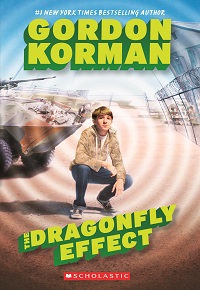| ________________
CM . . .
. Volume XXIII Number 3. . . .September 23, 2016
excerpt:
In this third installment of “The Hypnotists” series, 12-year-old hereditary hypnotist Jackson Opus has been taken into the protection of the US Army where he is trained, along with other master mind-benders, in new war techniques based on their skills. Jax is horrified when he is asked to participate in an experiment where a post-hypnotic suggestion to freeze in place at a particular moment leads to near-disaster among a “town” of volunteers, causing accidents and fires as residents let their vehicles and cooking run by themselves. When eight-year-old orphan Stanley X, the only young prodigy to ever bend Jax, is suddenly adopted by a mysterious stranger, Jax suspects the army brass has been hypnotized, and he discovers that Stanley has actually been co-opted by Dr. Elias Mako, his evil nemesis, in a gigantic plot to reproduce that experiment worldwide through a message implanted in a hugely popular gaming website. Jax escapes from the army base, hitchhikes to New York, and, with the help of some friends, discovers Stanley at a horse farm in rural New Jersey, where the two once again battle their minds, and Jax discovers the word planted by Mako to bring everyone out of their reverie. The group speed to the UN in New York City on a horse, arriving as Mako attempts to take over a massive UN convention, using the media coverage to hypnotize viewers to shout the magic word “dragonfly” to save the world from destructive idleness. Korman is a master of speculative, adventurous, and completely unpredictable and gripping stories that never let up. A story like this, with its intricate plot and near-unbelievable premise (that hypnotism is all-powerful, hereditary, and concentrated in a handful of powerful families, including—it would seem—Winston Churchill’s), could easily be full of holes and near-laughable in its execution. In Korman’s hands, it succeeds. Not that there aren’t a few inconsistencies in the story. Jax is often faced with the dilemma that he can only “bend” one person at a time and so can’t defeat multiple enemies; and yet, he and his friends do exactly that to get past the numerous guards at the UN. The “freeze” experiment results in multiple fires in mere minutes—whose cooking catches fire that soon after attention wanders? When Jax first becomes aware of the game-site plot, he listens to the message without looking, so that he won’t be bent—yet seems aware that he was most certainly already bent in previous gaming sessions. It’s an essential plot twist—Stanley tells his viewers that the magic word to make them go back to normal is the thing he is holding in his hand: a porcelain dragonfly. Not knowing what it is, Jax engages in the final epic mind battle with mirrors that allows him to literally see all of Stanley’s thoughts. (In one of the book’s few tender moments, he sees Stanley’s fantasies of having a real family). Characters are somewhat one-dimensional—most of the kids are brilliant but constrained by adult control; the army Colonel Brassmeyer is rigid and unsympathetic; Mako and his ilk are simply evil. But through it all, the reader will continually be enthralled, and even challenged, by the implications of a world where this might all be possible. All in all, The Dragonfly Effect is—literally—mind-bending fun. Highly Recommended. Todd Kyle is the CEO of the Newmarket Public Library in Ontario and President of the Ontario Library Association.
To comment
on this title or this review, send mail to cm@umanitoba.ca.
Copyright © the Manitoba Library Association. Reproduction for personal
use is permitted only if this copyright notice is maintained. Any
other reproduction is prohibited without permission.
Next Review | Table of Contents For This Issue - September 23, 2016 |
